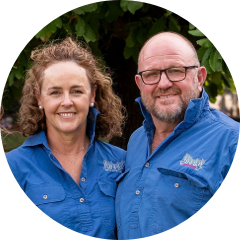Optimising slug management
Term
2024-2026
Project Officer
Sabita Duwal
WHY THIS PROJECT IS IMPORTANT
Slugs are becoming a major issue in the Riverine Plains region, with a recent run of good starts and wet seasons likely contributing to their appearance in new areas. Canola is widely grown across the Riverine Plains and is especially vulnerable to seedling damage by slugs. Where slugs are left unchecked, seedling damage can be extensive and crops may need to be resown.
Because the economic cost to farmers of annual chemical control programs is significant, farmers are looking at ways to better understand and manage existing slug populations.
This project aims to investigate best practice to reduce slug damage in canola using chemical and non-chemical options. It involves the monthly monitoring of slug populations in dryland and irrigated paddocks located in NSW and Victoria, as well as the design and establishment of annual spring baiting trials, including non-chemical treatments, in collaboration with SARDI
Project focus
This project addresses the Riverine Plains strategic objectives of lowering production risk, optimising profitability and production, and increasing system sustainability and resilience.
The project involves a two-year chemical trial, through an investment by the GRDC, and a non-chemical component (2024), supported by the Victoria Drought Resilience Adoption and Innovation Hub.
The two-year replicated chemical trial will evaluate spring baiting prior to sowing canola the following autumn. Treatments will include a control, as well as two different baiting treatments.
This project involves the monthly monitoring of slug populations in several dryland and irrigated paddocks located in NSW and Victoria. Extension events and activities will also support farmers in better understanding and managing their slug populations
Project outcomes
As part of the non-chemical slug control project component, supported by the Victoria Drought Resilience Adoption and Innovation Hub, an industry survey was conducted by Riverine Plains to better understand current practices used by farmers and investigate patterns that may have caused increases in slug populations in north east Victoria and southern NSW over the last five years. Results were analysed by Dr Michael Nash and the report published in Research for the Riverine Plains, 2025.
Key messages from the survey
- A 2024 Riverine Plains’ slug survey found that slug damage had increased over the past five years, likely in response to wetter seasonal conditions.
- Slug management cost 33 percent of respondents between $1– 50/ha, while 56 percent spent $50–100 /ha, and 4 percent spent over $100/ha.
- The survey revealed a high reliance on three insecticide groups — 4A, 1B & 3A — which are all disruptive to carabid beetles (predators of slugs).
- The survey suggests some confusion between the direct impacts of modern farming practices, such as conservation agriculture on slug populations, and the indirect effects of burning and cultivation
Learn more by reading the full article: Non-chemical control options for slugs – results from the Riverine Plains industry survey.
The results are also being used to better understand the presence or absence of slugs, the level of damage being experienced by farmers across the region, as well as the control practices that are currently being used. The survey results are informing activities for the second year of the project and are also being used to understand the potential for non-chemical slug control strategies to help farmers avoid the significant costs associated with chemical control.
Read the GRDC project report
Slug communities' response to environment and management across southern Australia
Monthly Slug Monitoring Reports
When and how to monitor for slugs
Monitoring slugs early in the season especially after rain or irrigation, when moist conditions favour slug movement and feeding. Refuge mats are a reliable and simple tool to assess slug pressure in cereal and canola paddocks. If you don't have access to slug mats, a hessian bag also works well.
1. Soak the Mats
Soak the mats in a bucket of water so they’re damp. slugs are attracted to cool, moist shelters.
2. Place Mats in the Paddock
Spread the mats between crop rows or near stubble.
Choose multiple locations across the paddock, arranged in transects, to account for the patchy distribution of slugs.
In large paddocks (> 40 ha), aim for at least 50 mats to get representative data.
Secure each mat using bamboo stakes or tent pegs.
3. Leave Overnight
Place mats in the late afternoon or evening, as slugs are most active at night.
4. Check Safely
Next morning, remove pegs from one side only, then lift the mat away from your body in case of hidden pests (like snakes).
5. Record Observations
Count the number of slugs found under each mat.
Identify and record the slug species where possible (e.g. grey field, black keeled, striped field).
Record the results to help track activity and guide control decisions.
6. Monitor Regularly
Repeat monitoring weekly during crop emergence, or after significant rainfall or irrigation.
Even 1–4 slugs per mat can cause economic damage to cereals at seedling stages (GS00–GS21).
Find out more
For further information, please contact Riverine Plains Project Support Officer Sabita Duwal by emailing sabita@riverineplains.org.au
Project investment
Partners
Focus areas
MORE ON Grains & Sustainability
Our research enhances food production, increases environmental resilience and improves community connection across the Riverine Plains. See how our research creates impact.
-
Grains
Sustainability
-
Business
Sustainability
-
Livestock
Sustainability
-
Grains
Business
-
Grains
Sustainability
-
Grains
Livestock
-
Grains
Livestock
-
Soils
Sustainability
-
Soils
Sustainability
-
Grains
Business
-
Sustainability
Drought
-
Sustainability
-
Grains
Sustainability
-
Grains
-
Grains
-
Soils
Grains
-
Soils
Sustainability
-
Grains
Soils
-
Drought
Grains
-
Soils
Grains
-
Grains
-
Grains
Soils
-
Soils
Grains
-
Fodder
Grains
-
Grains
-
Soils
Sustainability
-
Grains
-
Soils
Sustainability
-
Grains
Soils
-
Sustainability
Grains
-
Grains
Sustainability
-
Soils
Grains
-
Grains
Sustainability
-
Livestock
Grains
-
Grains
Soils
-
Sustainability
Grains
JOIN RIVERINE PLAINS
Riverine Plains provides opportunities to see new research and innovation, connect with rural communities, and attend informative events.


